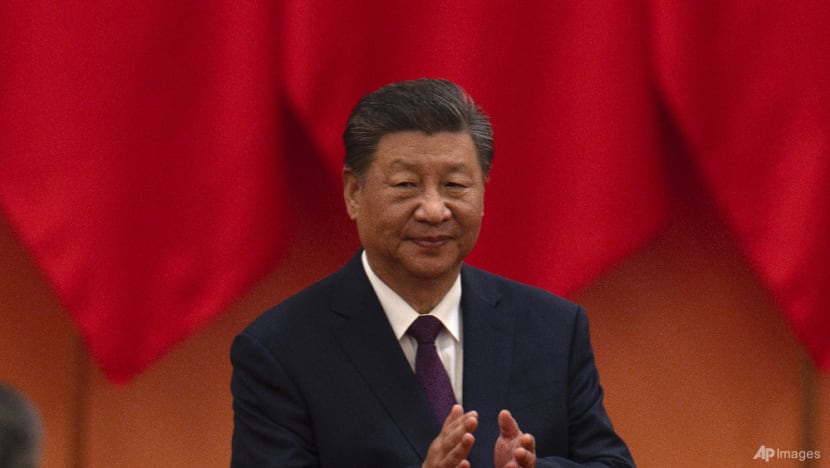Commentary: At 75, China may be unwittingly veering down a path it tries to avoid
As China marks the 75 years since the founding of the People’s Republic, there is a palpable irony in its current trajectory and President Xi Jinping’s quest to avoid the fate of the Soviet Union and resist US containment, says Lizzi C Lee of the Asia Society Policy Institute.

Chinese President Xi Jinping attends a ceremony to award national medals at the Great Hall of the People in Beijing, Sunday, Sep 29, 2024. (AP Photo/Ng Han Guan)

This audio is generated by an AI tool.
NEW YORK: As China celebrates the 75th anniversary of the People’s Republic on Tuesday (Oct 1), the milestone invites more than reflection – it calls for a deeper reckoning.
Seventy-five years is a significant marker, especially when viewed through the lens of the Soviet Union (and post-revolution Soviet Russia), another communist superpower that demised just shy of its 75th year. This historical echo is not lost on Chinese President Xi Jinping.
Mr Xi has meticulously studied the Soviet downfall to steer China away from a similar fate. The lessons from that collapse – strengthening Party control, bolstering ideological discipline, and pursuing economic self-reliance – are integral to his governance.
Yet, as China commemorates this anniversary, a pressing question looms: Has the nation already peaked, or are deeper challenges on the horizon? And more critically, are Mr Xi’s policies themselves creating the instability he aims to avoid?
China’s remarkable economic rise, which for decades underpinned the legitimacy of the Communist Party, is now showing signs of strain. A confluence of factors – slowing growth, a real estate crisis, mounting local government debt, and a rapidly ageing population – has created a perfect storm.
The data is revealing: Retail sales increased by just 3.7 per cent in the first half of 2024, while property investment fell by over 10 per cent. Local governments, weighed down by trillions in hidden debt, are struggling to maintain basic services. Foreign investors, once eager to capitalise on China’s growth, are pulling back, increasingly wary of ideology-driven policies.
IDEOLOGICAL PURITY COMES AT A COST
Mr Xi’s response to these economic pressures highlights his overarching ideological approach.
One core lesson from the Soviet collapse – frequently discussed in Chinese scholarly circles – is that ideological erosion, not merely economic weakness, led to the Soviet Union’s disintegration. For Mr Xi, the breakdown of ideological discipline, beginning with Nikita Khrushchev’s 1956 denunciation of Josef Stalin, marked the start of the Soviet regime’s downfall.
This conviction explains why maintaining strict ideological control, particularly through the promotion of “Xi Jinping Thought”, remains at the core of his governance strategy. However, this focus on ideological purity comes at a cost.
By tightening his grip over China’s economy and society, Mr Xi risks triggering the very stagnation he seeks to avoid. The tension between maintaining political security and fostering economic growth has never been more acute, and the coming years will test his ability to strike a balance the need for political stability with the necessity of economic dynamism.
This moment of reckoning coincides with a critical juncture for Xi Jinping. The Third Plenum – a key economic meeting in the party’s five-year cycle – has set the clock ticking for Xi to secure his legacy.
His vision for China is bold: To lead the Fourth Industrial Revolution and establish the country as a pioneer in cutting-edge fields such as artificial intelligence, clean energy and advanced manufacturing. “Indigenous innovation” is no longer just a catchphrase; it is now essential to China’s national security and economic resilience.
His message is clear: China must evolve beyond catch-up growth and emerge as a global leader in next-generation industries, and in doing so, create buffers against Western pressures, ensuring that China is not as easily contained as the Soviet Union once was.
XI JINPING’S STRATEGY
Yet, transitioning to a new economic model is proving more difficult than anticipated.
Emerging sectors like AI, robotics and quantum computing are inherently capital-intensive but offer limited avenues for job creation, leaving millions of young graduates navigating a shrinking pool of viable employment. The rapid automation of traditional industries further exacerbates this issue, displacing workers from sectors that once provided stable livelihoods.
Mr Xi’s push for high-tech self-reliance may bolster national security in a narrow sense. However, it risks deepening the country’s economic imbalances and fraying the social fabric.
The tension between pursuing cutting-edge innovation and addressing the immediate economic realities of the populace places increasing strain on the party, threatening stability on which its legitimacy rests.
His trade strategy is rife with inherent contradictions. Efforts to modernise domestic manufacturing and achieve high-tech self-reliance, aimed at countering US dominance, have simultaneously intensified overcapacity issues and inflamed trade tensions.
The rapid expansion of sectors – such as electric vehicles, solar panels and advanced manufacturing – has led to surpluses that far outstrip domestic demand, forcing China to increasingly turn to foreign markets, particularly in the Global South, to absorb the excess. Yet, this reliance threatens to erode the already fragile industrial foundations of these nations, complicating China's wider geopolitical ambitions.
In seeking to counter US dominance, China’s assertive economic diplomacy brings its own perils. China's activities in the South China Sea and its Belt and Road Initiative have fueled unease in Western capitals, prompting a more coordinated response from the US and its allies through mechanisms like AUKUS and the Quad.
CHINA AT A CRITICAL JUNCTURE
There is a palpable irony in China’s current trajectory. In Mr Xi’s quest to avoid the fate of the Soviet Union and resist both ideological decay and US containment, China may be unwittingly veering toward a similar path.
In his bid to consolidate power and secure his legacy, he narrows the scope for flexibility, thereby reducing China’s capacity to adapt to shifting global and domestic realities.
Three quarters of a century on, the People’s Republic of China stands at a defining crossroads.
The lessons Xi Jinping has drawn from the Soviet Union’s collapse are central to his vision for the future. Yet, the next few years will reveal whether China can successfully transition to a more sustainable phase of development or whether the challenges it faces will prove more daunting than anticipated.
For Mr Xi, this is not merely about safeguarding his personal legacy; it is about ensuring that the Communist Party’s vision for a rejuvenated China endures.
Lizzi C Lee is Fellow on Chinese Economy at the Asia Society Policy Institute’s Center for China Analysis.


















